LeadMine Alternatives
Find a LeadMine alternative. This guide compares 10 tools based on features, pricing, and data accuracy to help you decide.

LeadMine is a popular tool for a reason. It's great for lead generation, known for being easy to use and saving time. Teams use it to find qualified leads and their emails quickly, which helps speed up sales.
Still, no tool is perfect. Some users find the credits limited or the contact data outdated. That's why we've analyzed the top alternatives, comparing them to LeadMine using G2 reviews to help you find the right fit. Let's get started.
Consider an 11x Digital Worker
If your team wants to use digital workers for sales tasks, consider 11x. These digital employees handle research, outreach, and other sales activities. Learn how they integrate with your existing sales processes.
At 11x, we provide a GTM platform that uses AI agents to handle your sales process. Our AI agent, Alice, finds prospects, conducts outreach on email and LinkedIn, and maintains your CRM.
Another agent, Julian, qualifies inbound leads and schedules meetings. Our platform consolidates tools for data enrichment, outreach, and email warmup, so you do not need separate solutions.
LeadMine Alternatives
Here is a detailed review of top LeadMine alternatives. Each review covers pricing, main features, and how they stack up against LeadMine, including potential benefits and drawbacks.
1) ZoomInfo SalesOS
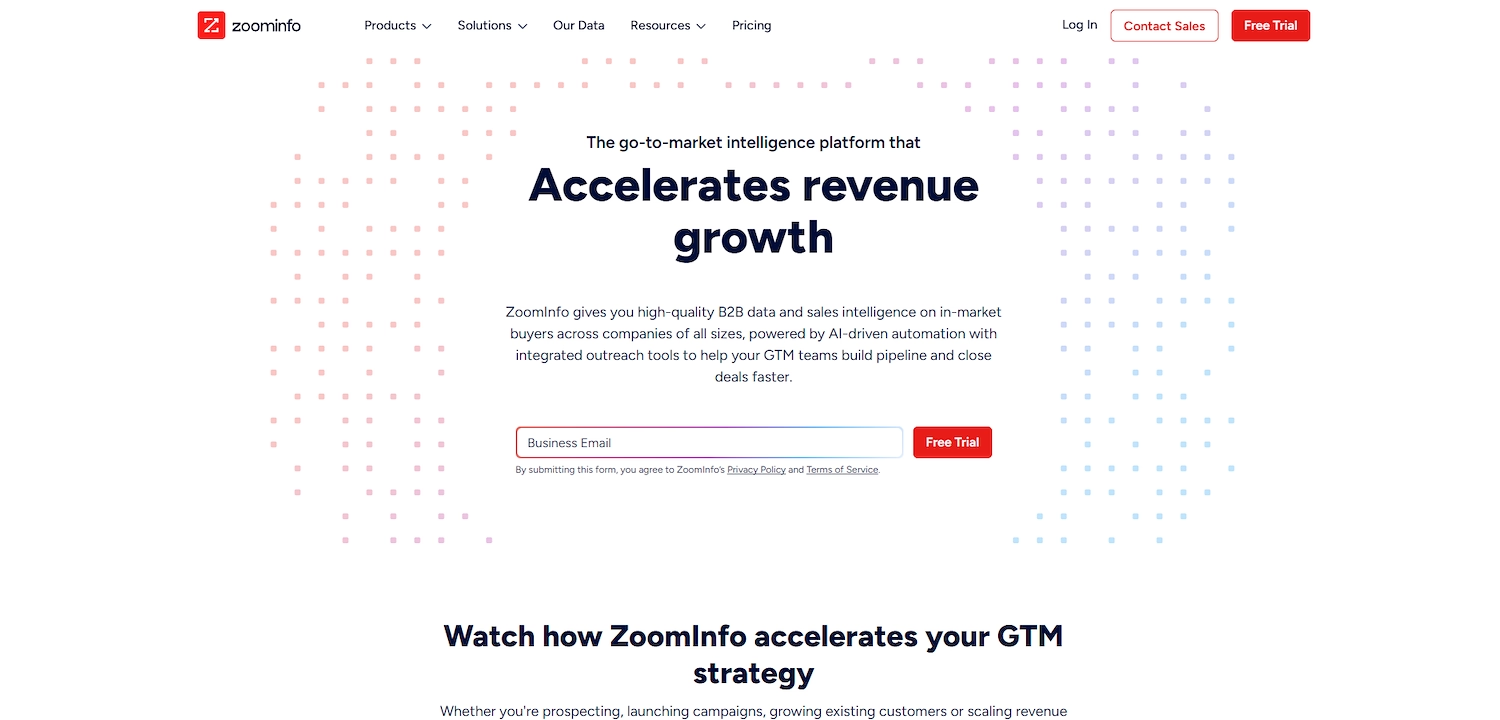
ZoomInfo SalesOS is a go-to-market intelligence platform for B2B organizations. It helps revenue teams identify and connect with valuable buyers. The platform unifies company data, buyer-intent signals, and automation tools into a single system.
Teams use it to prospect and build prioritized lead lists with verified contact data. It also helps to identify in-market accounts and engage them across channels to generate a sales pipeline.
ZoomInfo SalesOS's Main Features
- Identifies ready-to-buy prospects using real-time intent signals.
- Analyzes call and meeting interactions with conversation intelligence.
- Automates go-to-market activities through triggered workflows.
- Offers a generative-AI companion to surface insights and draft outreach.
How ZoomInfo SalesOS Compares to LeadMine
Average Review score: 4.5/5 stars based on 8,738 G2 reviews.
- ZoomInfo SalesOS provides a larger and more frequently refreshed database than LeadMine, which helps teams access more accurate contact and company data.
- The platform identifies prospects who are ready to buy using real-time intent signals, a more advanced feature compared to the basic lead discovery in LeadMine.
- It includes a generative AI companion that offers guided selling recommendations, providing more support for sales outreach than LeadMine's data-finding tools.
- This tool offers conversation intelligence to analyze sales calls, providing insights to improve sales pitches that extend beyond LeadMine's lead generation capabilities.
Potential Drawbacks Of ZoomInfo SalesOS
- ZoomInfo SalesOS comes with a higher price, which may not suit teams with a limited budget. LeadMine often presents a more affordable entry point for lead generation.
- The tool requires a longer setup period, sometimes up to a month to implement fully. In comparison, LeadMine offers a simpler interface that teams can often use with minimal onboarding.
- Its subscription model can be less flexible than LeadMine's credit-based system. This structure may not be ideal for users who prefer to pay for data as they go instead of committing to a long-term contract.
Pricing and Cost-Effectiveness
LeadMine offers transparent monthly pricing, with a free plan and paid tiers like the Basic plan at $29 per month. In contrast, ZoomInfo SalesOS operates on a custom quote basis, reflecting its enterprise focus and higher cost. This makes LeadMine a practical option for budget-conscious teams, while ZoomInfo is built for larger organizations.
2) Apollo.io
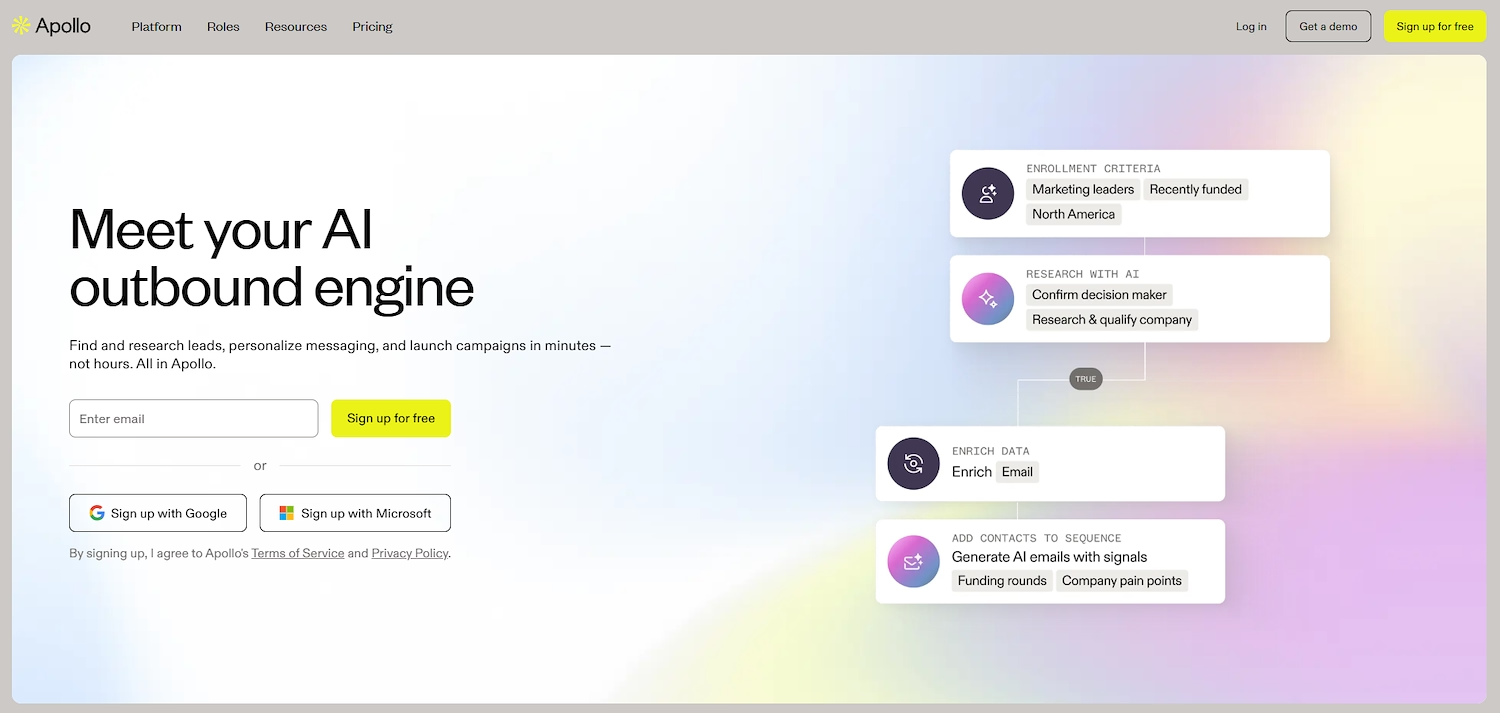
Apollo.io is a sales intelligence and engagement platform. It provides a database with contact and company information to help users find their next customer. The platform combines this data with tools for outreach and workflow automation.
Teams use it to build prospect lists, connect with decision-makers, and manage their sales pipeline within one system.
Apollo.io's Main Features
- Offers a database of over 275 million contacts for prospecting.
- Provides tools for sequencing emails and calls to automate outreach.
- Includes a scoring engine to prioritize leads based on engagement.
- Analyzes sales calls and meetings to provide coaching insights.
How Apollo.io Compares to LeadMine
Average Review score: 4.7/5 stars based on 8,904 G2 reviews.
- Apollo.io provides a database of over 275 million contacts. This offers a wider pool to find prospects compared to the lead discovery function in LeadMine.
- The platform integrates engagement tools, such as email and call sequences, directly with its contact data. LeadMine, in contrast, focuses primarily on the data itself.
- It includes a scoring engine that helps sales teams prioritize leads based on engagement signals, a feature not available in LeadMine.
- This tool analyzes sales calls and meetings to offer coaching insights. This extends its function beyond LeadMine's core focus on lead data retrieval.
Potential Drawbacks Of Apollo.io
- Apollo.io offers many features, which can create a steeper learning curve for some teams. In comparison, LeadMine provides a more focused and simpler user experience for lead discovery.
- Some users report that contact information in its large database is occasionally out of date. This is a common issue, but teams may find LeadMine more direct for specific, verified data needs.
- The platform's all-in-one design might be too complex for users who only need basic lead generation. LeadMine's specialized function offers a straightforward solution for finding contact data without extra tools.
Pricing and Cost-Effectiveness
Both platforms offer a free plan, but LeadMine has a lower entry point for paid tiers at $29 per month, while Apollo.io's Basic plan is $49 per month. This makes LeadMine a more cost-effective choice for basic lead generation, whereas Apollo.io's pricing reflects its comprehensive suite of engagement tools.
3) Lusha
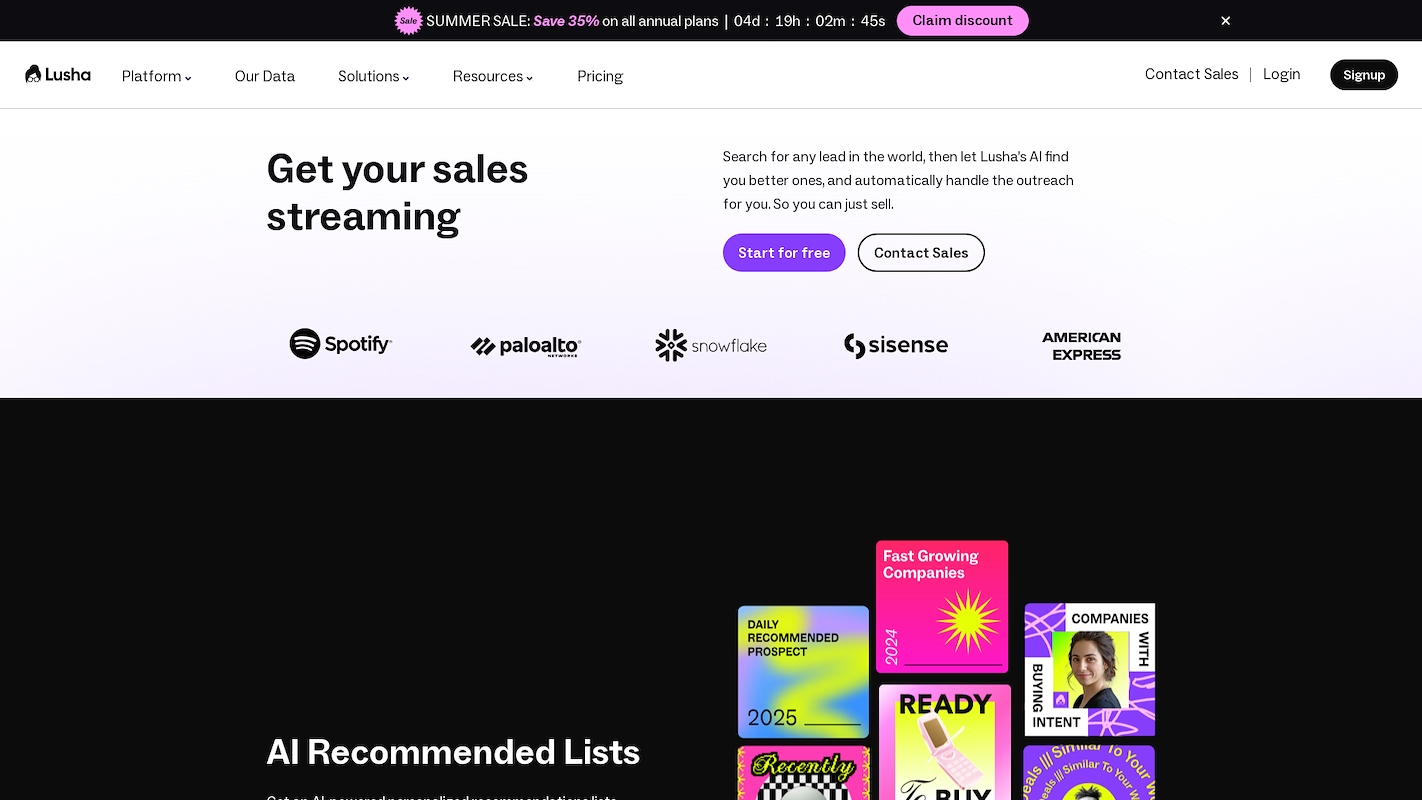
Lusha is a sales-intelligence platform that uses AI to help revenue teams find B2B leads worldwide. It provides recommendations for similar prospects and automates multichannel outreach within a single workflow. The platform emphasizes global data coverage and compliance with standards like GDPR and CCPA.
Teams use it to build prospect lists, prioritize outreach with buyer-intent signals, and automate personalized email sequences.
Lusha's Main Features
- Identifies in-market buyers and sends real-time notifications based on intent triggers.
- Provides daily lists of companies and decision-makers based on your ideal customer profile.
- Automates personalized email sequences with AI-generated copy.
- Records and analyzes sales meetings to provide performance insights.
How Lusha Compares To LeadMine
Average Review score: 4.3/5 stars based on 1,516 G2 reviews.
- Lusha uses AI Prospect Playlists to automatically generate and refresh lead lists. This offers a more dynamic approach than LeadMine, where users often build static lists manually.
- The platform identifies in-market buyers through intent signals and sends real-time alerts. This is a more proactive feature compared to LeadMine's standard lead discovery function.
- It automates personalized outreach sequences directly within the platform. LeadMine, by contrast, primarily supplies the contact data and does not include outreach tools.
- This tool highlights its compliance with global data regulations like GDPR and CCPA. This provides an advantage for teams that need to ensure their prospecting efforts meet international standards.
Potential Drawbacks Of Lusha
- Lusha's paid plans begin at a higher price point than LeadMine's. This makes LeadMine a more budget-friendly choice for teams that need a simple data-finding tool without extra features.
- Some users find that the credit allowance can be restrictive, especially for phone numbers. Teams that need a high volume of direct dials might find LeadMine's credit structure more suitable for their needs.
- Its wide range of features, like outreach automation, can create a steeper learning curve. In comparison, LeadMine provides a more focused user experience for teams that only need to find contact information quickly.
Pricing and Cost-Effectiveness
While both platforms offer a free plan, LeadMine's paid tiers start at $29 per month, which is lower than Lusha's entry point of $36 per month. This makes LeadMine a more cost-effective choice for basic lead generation, while Lusha's pricing reflects its broader set of features.
4) Hunter
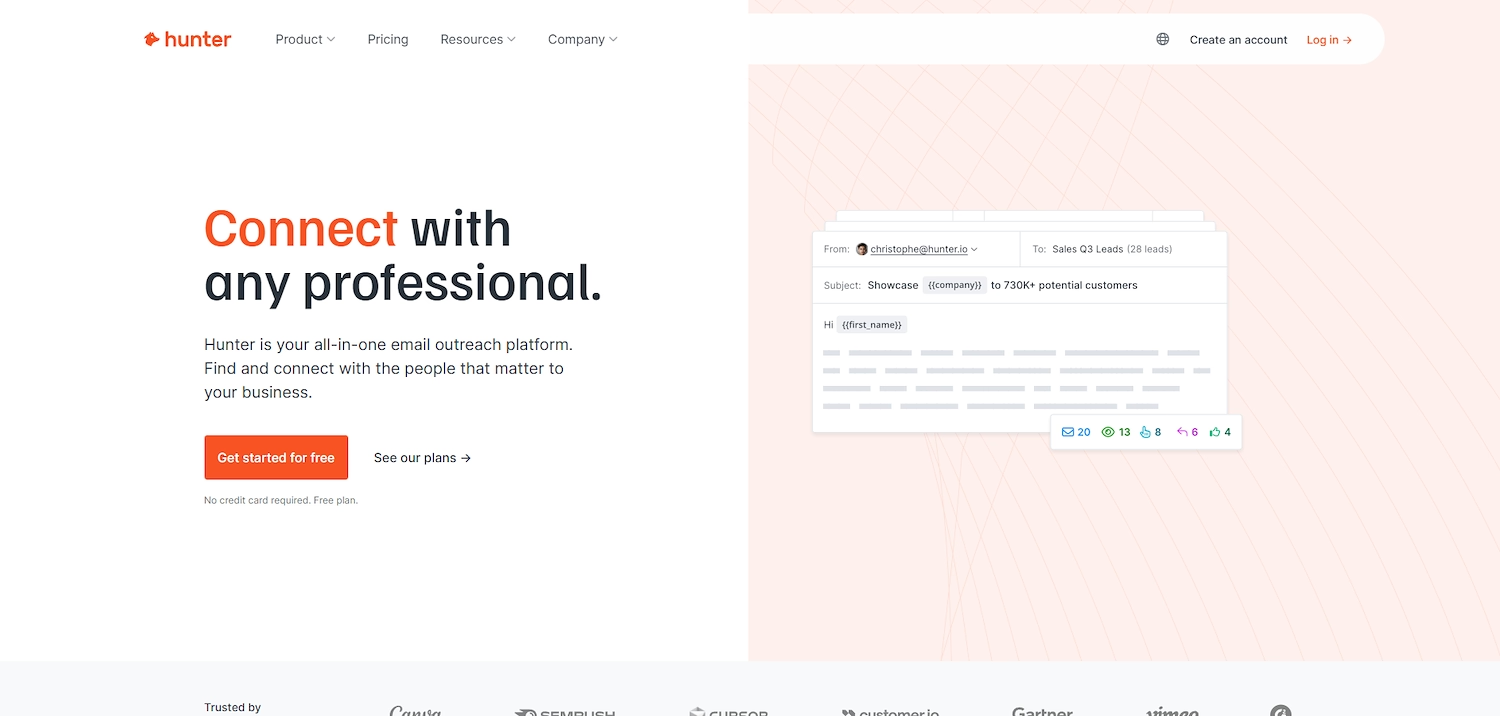
Hunter is a platform to find professional email addresses. Users can search for contacts by company domain or by a person's name and company. The tool also includes an email verifier to check the deliverability of addresses. It helps sales teams build contact lists for outreach campaigns.
Hunter's Main Features
- Finds publicly available email addresses from a company domain or URL through its Domain Search feature.
- Verifies email lists in bulk to reduce bounce rates and protect sender reputation.
- Includes a Campaigns tool to compose personalized messages, schedule automated follow-ups, and view performance analytics.
- Offers a TechLookup feature that identifies websites based on the technology stack they use.
How Hunter Compares To LeadMine
Average Review score: 4.4/5 stars based on 592 G2 reviews.
- Hunter includes a Campaigns tool for sending personalized emails and automated follow-ups. This provides an all-in-one solution, unlike LeadMine, which focuses only on data collection.
- The platform offers a bulk email verifier to check lists and reduce bounce rates. This feature is more central to Hunter's offering compared to LeadMine's data provision.
- It provides a TechLookup feature that finds websites using a specific technology stack. This allows for more targeted prospecting than LeadMine's general lead-finding capabilities.
- The tool's Domain Search finds all publicly available email addresses associated with a specific company domain. This is a more direct search method compared to LeadMine's broader lead list building.
Potential Drawbacks Of Hunter
- Hunter focuses mainly on the discovery of email addresses. In comparison, LeadMine often provides more detailed lead profiles, which helps sales teams qualify prospects more effectively.
- Some users find Hunter's plans can be expensive for the number of searches provided. LeadMine's credit-based system might offer more flexibility for teams with variable needs.
- The tool primarily finds publicly available email addresses. This can sometimes result in fewer contacts for certain domains compared to LeadMine, which may use different data-sourcing methods.
Pricing and Cost-Effectiveness
Both platforms offer a free plan. LeadMine provides a more affordable entry point with its Basic plan at $29 per month, while Hunter's starter plan begins at $49 per month. This makes LeadMine a more cost-effective option for teams with smaller budgets.
5) RocketReach
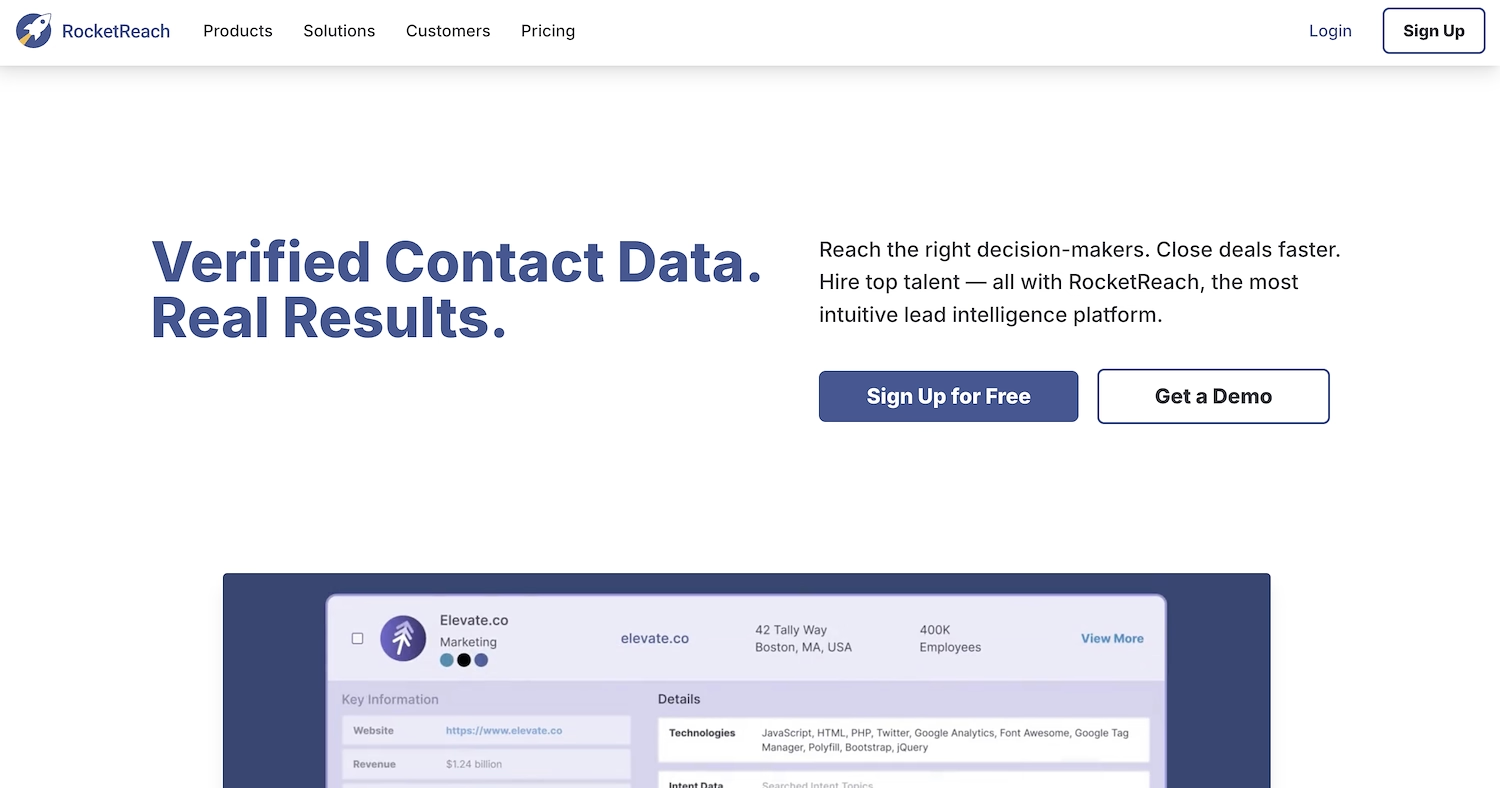
RocketReach provides access to a database of over 700 million professionals and 35 million companies. The platform helps users find contact information, such as emails, phone numbers, and social media profiles.
Sales teams use this data to identify and connect with prospects. The tool functions as a large contact directory to support lead generation and outreach efforts.
RocketReach's Main Features
- Provides access to a database of over 700 million professionals and 35 million companies.
- Finds contact information for prospects, including emails, phone numbers, and social media profiles.
- Functions as a large contact directory to help sales teams identify and connect with leads.
How RocketReach Compares To LeadMine
Average Review score: 4.4/5 stars based on 918 G2 reviews.
- RocketReach provides access to a database of over 700 million professionals, which offers a larger pool of contacts compared to LeadMine.
- The platform finds social media profiles along with emails and phone numbers, giving a more complete prospect view than the standard contact data in LeadMine.
- It connects directly with CRMs like Salesforce and HubSpot, which allows for a smoother data workflow compared to LeadMine.
- This tool offers specialized contact data for industries such as healthcare, providing more targeted information than LeadMine's general database.
Potential Drawbacks Of RocketReach
- RocketReach has a higher starting price for its paid plans compared to LeadMine. This might make LeadMine a more accessible option for teams with smaller budgets who need basic lead data.
- The platform's advanced features, such as its API and numerous integrations, can create a steeper learning curve. In comparison, LeadMine provides a simpler user experience focused on core lead-finding tasks.
- Some users report that contact information in the large database is occasionally out of date. Teams that need a smaller, more focused dataset might find LeadMine's data sufficient for their needs.
Pricing and Cost-Effectiveness
Both platforms offer a free plan. LeadMine's paid tiers start at $29 per month, making it a more budget-friendly option. RocketReach's paid plans begin at $99 per month, a price that reflects its larger database and lookup-based model for teams with higher volume needs.
See What an 11x Digital Worker Can Do
For teams that want to use digital workers in their sales process, 11x provides AI agents for specific tasks. They find prospects, manage outreach, and qualify leads. Learn how an AI agent can support your sales operations and help your team focus on deals.
At 11x, we use AI to run your sales playbook. Alice finds the right accounts, enriches data, and handles outreach. Julian qualifies prospects and schedules meetings. Our platform includes everything from intent signals to email warmup, replacing the need for extra tools.
Book a demo to see 11x in action.
6) Clearbit
Clearbit is a data activation platform that enriches customer records in real time. It integrates with sales and marketing systems to provide data on leads, contacts, and accounts. Teams use it to understand their customers and personalize interactions based on up-to-date information.
Clearbit's Main Features
- Enriches new leads with over 100 data points, including company size and technology used.
- Identifies anonymous website traffic to reveal which companies are visiting your site.
- Provides data for creating targeted advertising audiences on platforms like Facebook.
- Offers an API to integrate data directly into custom applications and workflows.
How Clearbit Compares To LeadMine
Average Review score: 4.4/5 stars based on 821 G2 reviews.
- Clearbit focuses on enriching existing records in real time within your CRM. LeadMine is primarily used to find new contact information and build lists from scratch.
- The platform identifies anonymous website visitors, turning unknown traffic into potential leads. This is a feature not found in LeadMine.
- It offers deep integrations with tools like Salesforce and Marketo for automated data updates. LeadMine's workflow is more manual, often requiring data export and import.
- Clearbit provides over 100 data points for each record. This offers a more detailed view of a prospect compared to the contact-focused data from LeadMine.
Potential Drawbacks Of Clearbit
- Clearbit's pricing is generally higher and geared toward larger companies. LeadMine offers more accessible plans for small teams or individual users with basic needs.
- The platform is designed for data enrichment, not prospecting. Teams that need to build lead lists from the ground up may find LeadMine more suitable for that specific task.
- Some users report that the data, while extensive, can sometimes be inaccurate or incomplete. This is a common challenge for data platforms of this scale.
Pricing and Cost-Effectiveness
Clearbit operates on a custom pricing model based on database size and monthly web traffic, which aligns with its focus on larger businesses. LeadMine provides transparent, tiered pricing starting at $29 per month, making it a more predictable and budget-friendly option for smaller teams.
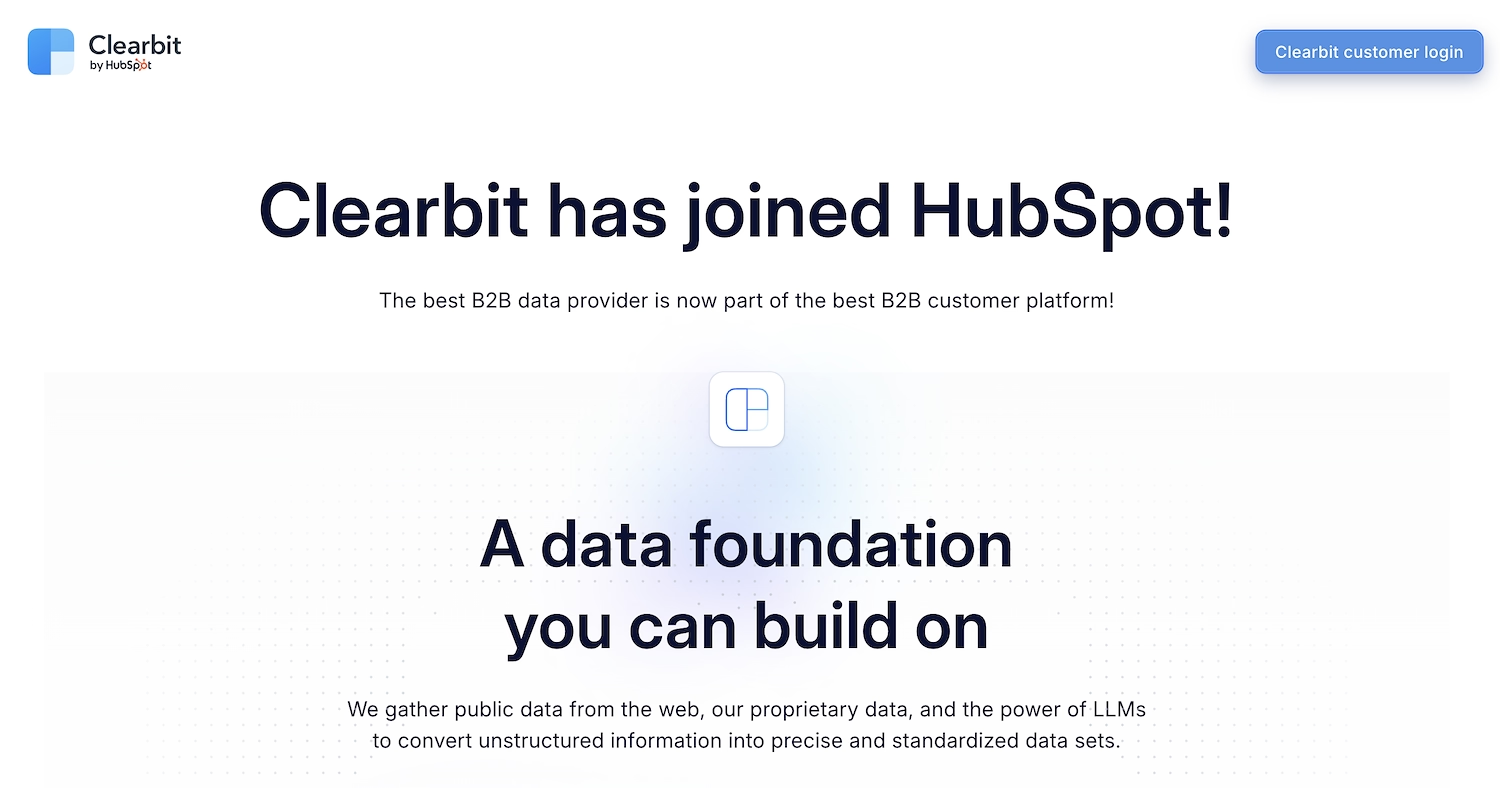
Clearbit is a data activation platform that enriches customer records in real time. It adds over 100 data points to leads and accounts inside your sales and marketing systems. Teams use this data to personalize interactions and identify anonymous website visitors to generate new leads.
Clearbit's Main Features
- Aggregates public web data and proprietary sources using LLM processing to deliver standardized B2B datasets.
- Adds firmographic and demographic details to enrich lead, contact, and account records.
- De-anonymizes website traffic to identify visiting companies that match an ideal customer profile.
- Shortens web forms by automatically enriching fields to reduce friction and increase conversion.
How Clearbit Compares To LeadMine
Average Review score: 4.4/5 stars based on 626 G2 reviews.
- Clearbit enriches existing leads with over 100 data points. This provides a more detailed profile compared to the basic contact information from LeadMine.
- The platform identifies anonymous companies that visit your website. This creates new leads from site traffic, a feature LeadMine does not have.
- It integrates directly with CRMs like HubSpot to update records automatically. This workflow is more seamless than LeadMine, which often requires manual data exports.
- This tool shortens website forms by auto-filling fields for known visitors. This function helps increase lead conversion rates, which is beyond LeadMine's scope.
Potential Drawbacks Of Clearbit
- Clearbit's pricing is based on a custom model, which is often better for larger companies. In comparison, LeadMine offers transparent, tiered plans that are more accessible for teams with smaller budgets.
- The platform is designed for data enrichment, not for building new lead lists from the ground up. LeadMine, by contrast, focuses on prospecting to help teams find new contacts.
- Some users report that its contact data can sometimes be out of date. Teams that need a smaller, more focused dataset might find LeadMine's information sufficient for their needs.
- Its implementation can take up to a month, which requires more initial setup time. LeadMine has a simpler interface that allows for quicker adoption and immediate use.
Pricing and Cost-Effectiveness
Clearbit operates on a custom pricing model based on database size and monthly web traffic, which aligns with its focus on larger businesses. LeadMine provides transparent, tiered pricing starting at $29 per month, making it a more predictable and budget-friendly option for smaller teams.
7) Snov.io
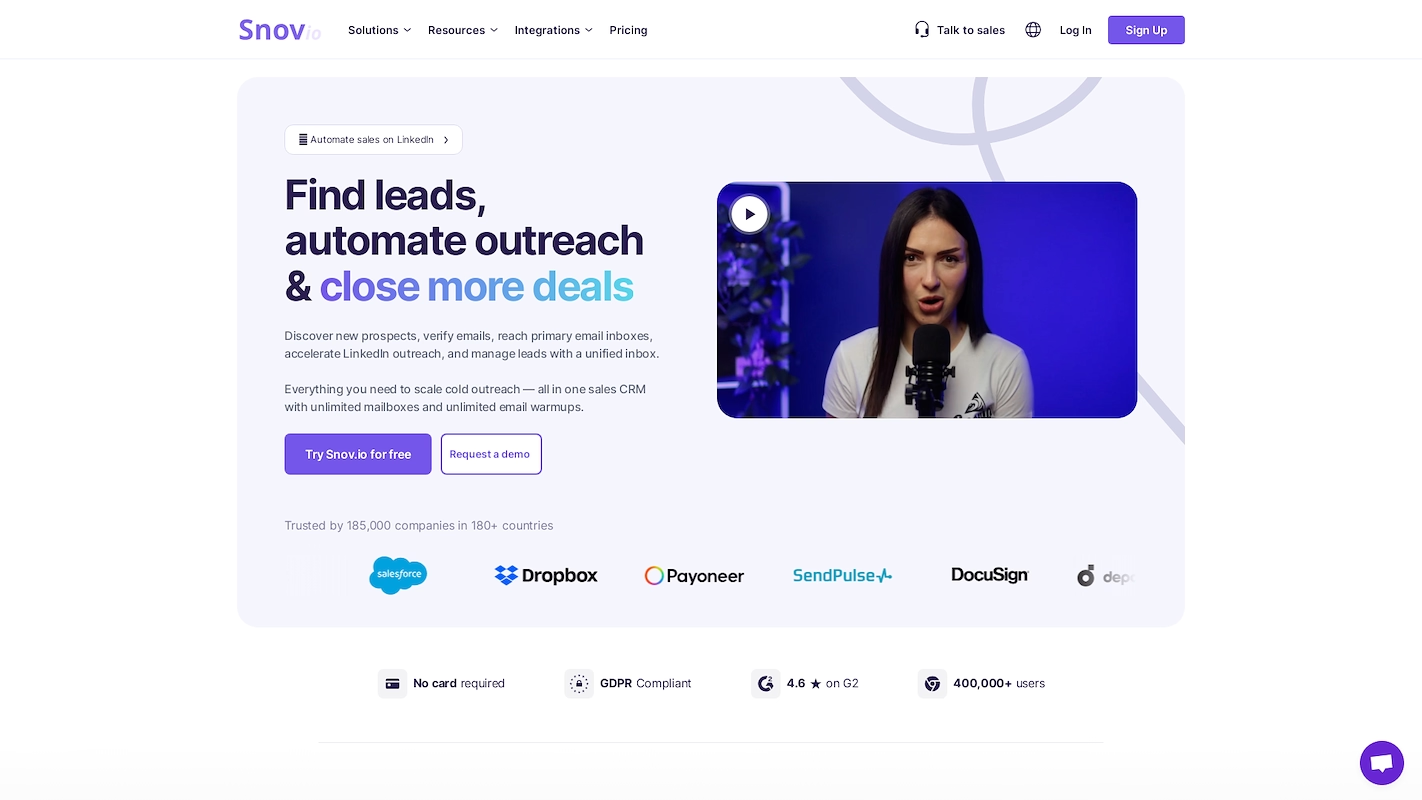
Snov.io is a sales automation platform for contact management and cold outreach. It offers tools to find and verify professional email addresses and create automated email campaigns. Sales teams use the platform to build prospect lists, engage potential customers, and track outreach performance.
Snov.io's Main Features
- Verifies emails with a 7-tier process to achieve 98% accuracy.
- Automates multichannel outreach campaigns from a unified inbox with unlimited sender accounts.
- Manages the sales pipeline with a built-in CRM that features automated deal stages.
- Offers an automated email warm-up tool to improve deliverability and inbox placement.
How Snov.io Compares To LeadMine
Average Review score: 4.6/5 stars based on 450 G2 reviews.
- Snov.io provides automated email drip campaigns to engage prospects directly within the platform. LeadMine, by contrast, supplies the contact data but does not include outreach automation tools.
- The platform includes a built-in CRM to manage the sales pipeline from lead to close. This is different from LeadMine, which requires exporting contacts to an external CRM system.
- It offers an email warm-up feature to improve sender reputation and deliverability. LeadMine focuses on finding emails but does not provide tools to manage inbox placement.
- This tool uses a multi-step verification process to ensure high email accuracy. This provides an extra layer of data quality compared to the standard verification in LeadMine.
Potential Drawbacks Of Snov.io
- Snov.io combines many tools, which can create a steeper learning curve for some users. LeadMine, in contrast, offers a more focused and simpler interface for teams that only need to find contact data.
- The platform's all-in-one design might be redundant for teams that already use a separate CRM or outreach tool. LeadMine's specialization in data provision can integrate into an existing sales stack without feature overlap.
- Some users find that while the tool is strong for email outreach, the lead profiles can lack depth. In comparison, LeadMine often provides more detailed company and contact information for better prospect qualification.
Pricing and Cost-Effectiveness
Both platforms provide a free plan. LeadMine's paid tiers start at $29 per month, while Snov.io's entry-level plan is $39 per month. This makes LeadMine a more budget-friendly choice for basic data needs, while Snov.io's pricing reflects its all-in-one sales automation features.
8) Skrapp
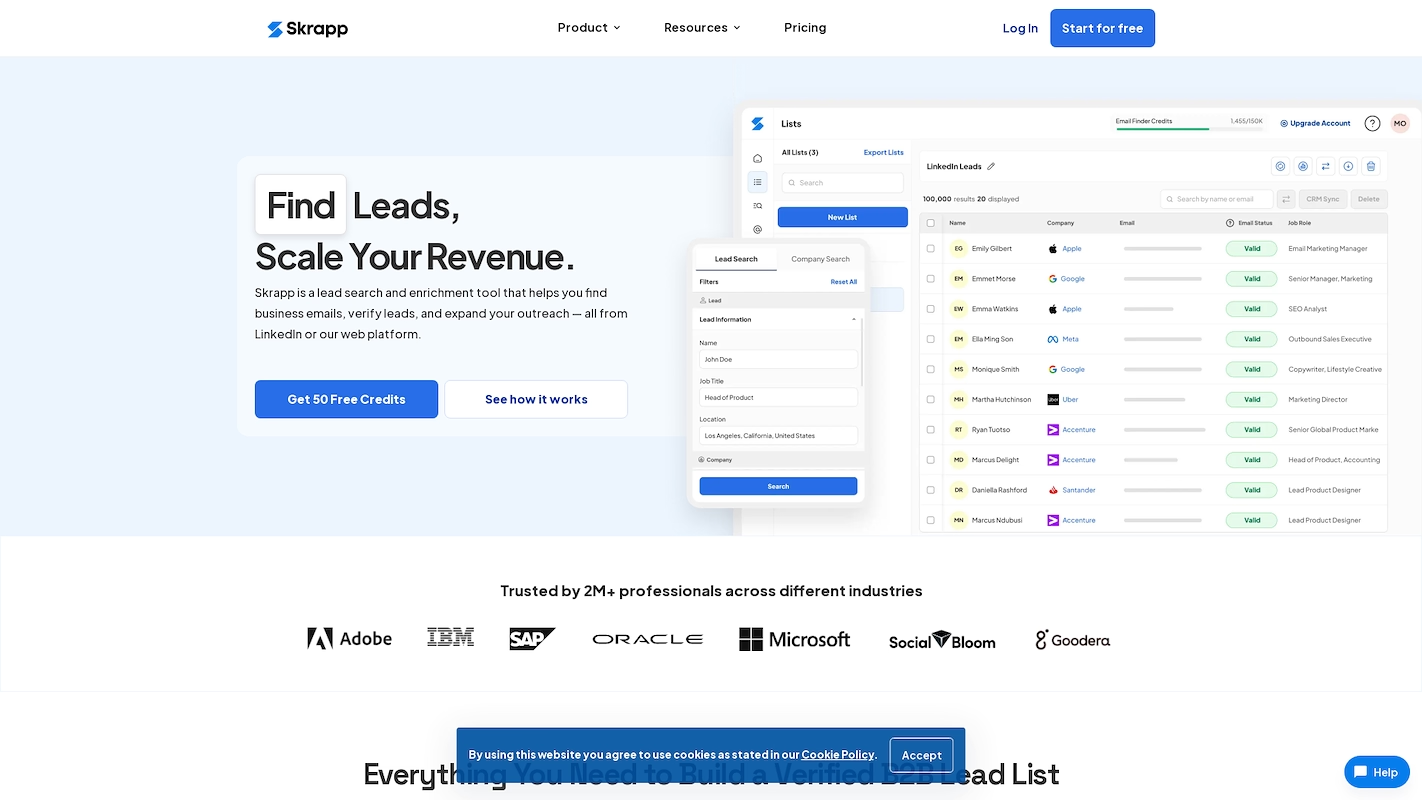
Skrapp is a B2B platform that finds verified email addresses from sources like LinkedIn and company websites. Sales and marketing teams use the tool to build targeted lead lists. It helps collect prospect data to support outreach campaigns and other sales efforts.
Skrapp's Main Features
- Integrates with LinkedIn and Sales Navigator to find emails on profiles.
- Provides a database search of over 150 million leads and 20 million companies.
- Includes an email verifier tool with a 97% accuracy rate.
- Features native integrations with CRM platforms like HubSpot, Salesforce, and Pipedrive.
How Skrapp Compares To LeadMine
Average Review score: 4.2/5 stars based on 170 G2 reviews.
- Skrapp finds emails directly on LinkedIn and Sales Navigator profiles through its extension, which provides a different workflow than LeadMine's broader search platform.
- Its email verifier tool checks addresses with a 97% accuracy rate, offering a more specific data quality check compared to the general verification process in LeadMine.
- The platform connects natively with CRMs like HubSpot and Salesforce, which allows for a smoother data transfer than LeadMine's manual export process.
- It provides a database of over 150 million leads, giving users a large pool for prospecting that may differ in scale from LeadMine's lead discovery function.
Potential Drawbacks Of Skrapp
- Skrapp focuses mainly on finding email addresses. In comparison, LeadMine often provides more detailed lead profiles, which helps sales teams better qualify prospects.
- Some users report that the monthly credits can be used up quickly. LeadMine's credit system, in contrast, may offer more flexibility for teams that have inconsistent search volumes.
- The tool's reliance on public sources like LinkedIn sometimes results in fewer contacts for certain domains. LeadMine may use different sourcing methods that provide a broader range of data.
Pricing and Cost-Effectiveness
Both platforms offer a free plan. LeadMine's paid plans start at $29 per month, while Skrapp's entry-level plan is $49 per month. This makes LeadMine a more cost-effective option for teams with smaller budgets, while Skrapp's pricing is structured for users who need a higher volume of credits.
9) UpLead
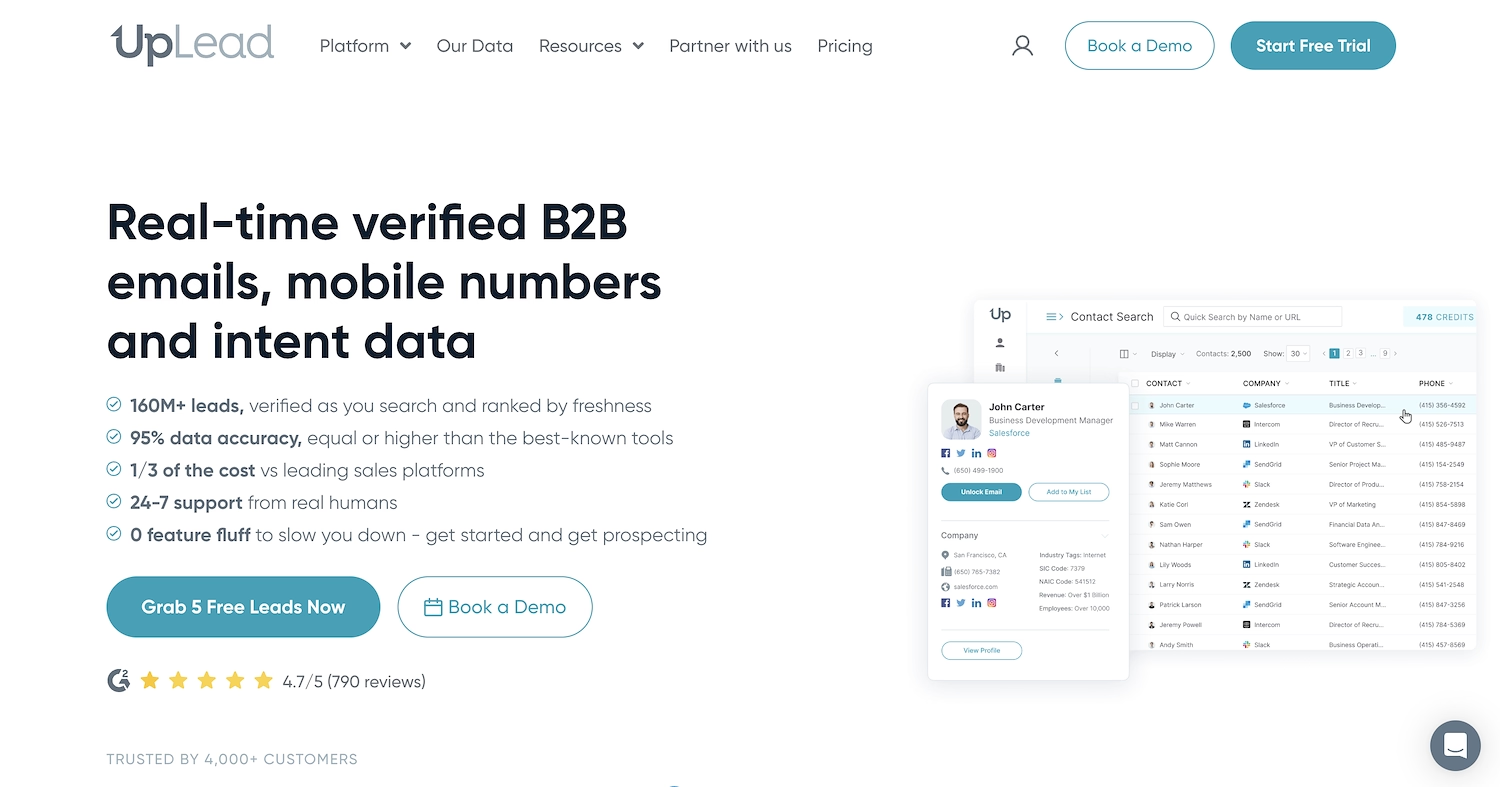
UpLead is a B2B data provider with a database of over 155 million contacts and a 95% accuracy guarantee. Teams use the platform to build targeted lead lists in real time and connect with qualified prospects for sales outreach.
UpLead's Main Features
- Offers real-time email verification to ensure data accuracy.
- Provides over 50 search filters, including intent data, to build targeted lists.
- Enriches contact and company data to provide more complete prospect profiles.
- Integrates with CRMs like Salesforce and HubSpot to automate data workflows.
How UpLead Compares To LeadMine
Average Review score: 4.7/5 stars based on 797 G2 reviews.
- UpLead provides real-time email verification with a 95% accuracy guarantee, which offers more confidence in data quality compared to the standard verification in LeadMine.
- The platform includes over 50 search filters, including intent data, for more targeted prospecting. This is a more advanced feature than LeadMine's general lead discovery.
- It integrates directly with CRMs like Salesforce and HubSpot, which automates data workflows. This is different from LeadMine, where users often need to export data manually.
- This tool enriches existing contact and company data to create fuller prospect profiles. LeadMine, in comparison, focuses more on finding new contact information.
Potential Drawbacks Of UpLead
- UpLead has a higher entry price for its paid plans compared to LeadMine. This can be a consideration for smaller teams that require a more budget-conscious tool to find leads.
- The tool offers many advanced features, such as intent data and over 50 search filters. Some teams might find this more complex than LeadMine's focused interface, which is built for direct contact discovery.
- Some users mention that the database can sometimes contain outdated contact information. For teams that need a smaller, more focused dataset, LeadMine's simpler approach to lead discovery might be sufficient.
Pricing and Cost-Effectiveness
Both platforms offer a free plan, but LeadMine's paid tiers start at $29 per month, while UpLead's begin at $99 per month. This makes LeadMine a more budget-friendly option for basic lead generation. UpLead's higher price reflects its advanced features and data accuracy guarantee, suiting teams with larger budgets.
10) Cognism
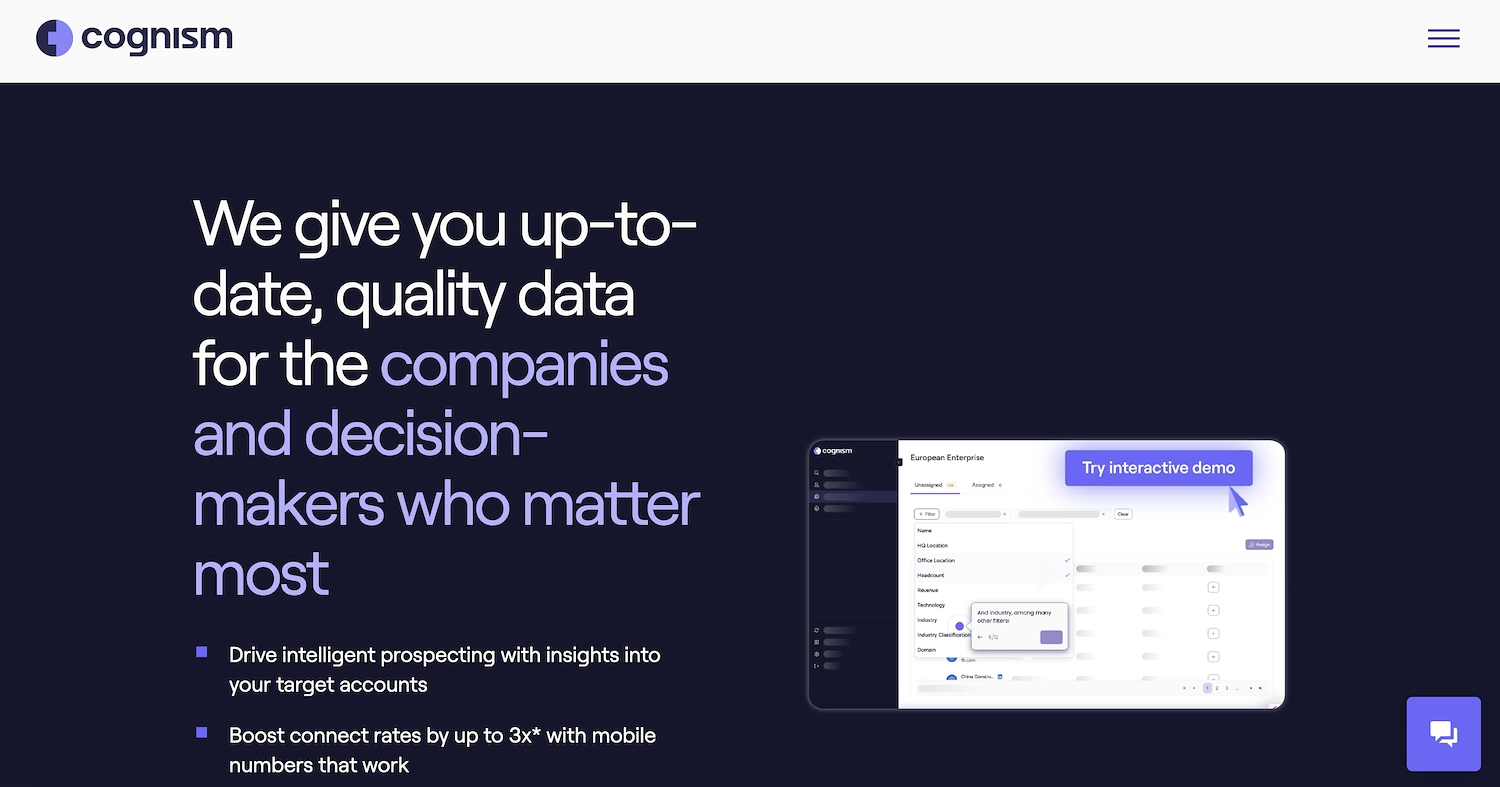
Cognism is a sales intelligence platform that provides verified B2B contact data. Sales and marketing teams use it to find mobile numbers and emails for prospects and build contact lists for outreach.
The platform emphasizes data compliance with regulations like GDPR and CCPA, which allows teams to connect with decision-makers in their target accounts.
Cognism's Main Features
- Provides contact and company data with a focus on European markets.
- Cleans and enriches data through integrations with CRM and marketing automation tools.
- Builds prospect lists using lead intelligence features like intent data and AI search.
- Validates lead information to maintain data accuracy for contacts and companies.
How Cognism Compares To LeadMine
Average Review score: 4.6/5 stars based on 1,033 G2 reviews.
- Cognism provides strong contact data for European markets, offering a specific focus compared to LeadMine's general database.
- It offers verified mobile numbers, which provides an alternative to LeadMine's primary focus on email addresses.
- The platform emphasizes compliance with data regulations like GDPR, a feature that is more prominent than in LeadMine.
- This tool uses intent data to identify active buyers, which is a more advanced feature than the standard lead discovery in LeadMine.
Potential Drawbacks Of Cognism
- Cognism has a higher price point, which can be a challenge for smaller teams. In comparison, LeadMine provides a more affordable entry plan for users on a tight budget.
- The platform can be complex and may require a longer setup time. In contrast, LeadMine has a simpler interface that allows teams to start their lead search almost immediately.
- Some users might find the subscription model less flexible than LeadMine's credit-based system. This structure may not be ideal for teams that prefer to pay for data as they need it.
Pricing and Cost-Effectiveness
Cognism operates on a custom pricing model tailored for enterprise clients, which reflects its higher cost. In contrast, LeadMine offers transparent, tiered pricing starting at $29 per month, making it a more accessible and budget-friendly option for smaller teams.
Which One Should You Go With?
The right LeadMine alternative depends on your team's specific needs, budget, and existing sales stack. This guide reviewed ten options to help you compare features and find a suitable platform for your goals.
If your goal is to automate sales tasks, 11x provides digital workers for prospecting, outreach, and lead qualification. The AI agents integrate into your process, which lets your team focus on closing deals instead of manual work.




